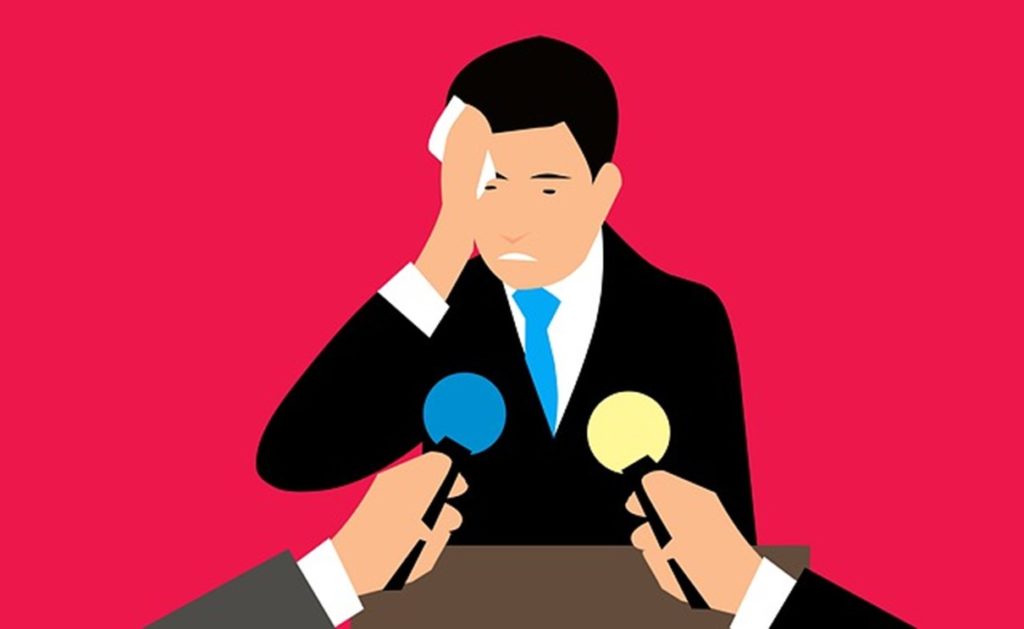
Take a look at this diagram from Mihaly Csikszentmihalyi’s great book Flow: The Psychology of Optimal Experience:
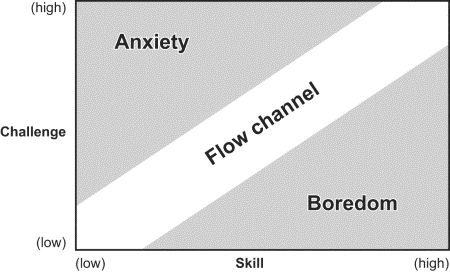
Flow is a state where you’re “in the zone,” performing well at a task you care about. One of the requirements for getting into flow, as shown above, is that your skill level must match the challenge. If it’s too easy, you’ll be bored; if it’s too difficult, you’ll feel anxious.1
But this diagram also has another lesson to offer, a powerful insight about anxiety.
The flow channel reveals that you’ll experience anxiety when a challenge you’re facing exceeds your skills. That makes sense: You’ll worry about your performance when you don’t have what it takes to do well.
But since anxiety is an emotional response to your interpretation of reality, there’s a subjective element to this: You could experience anxiety because the challenge is genuinely beyond your skills, or you could experience anxiety because you think the challenge is beyond your skills.
In other words, there are two kinds of anxiety:
Type 1: You feel anxious because your skills are truly not enough to perform the task.
Type 2: You feel anxious because you’re imagining the challenge is greater than it really is, you think your skill level is lower than it really is, or both.
This distinction is important because the solution to your anxiety depends on the type of anxiety you’re experiencing.
(There’s also a third type of anxiety, which we’ll get to at the end.)
Overcoming Type 1 Anxiety
If you’re feeling anxious because you genuinely don’t have the skills to perform the task, the solution is quite simple: increase your skills.

Perhaps you need to learn something in order to meet the challenge. Perhaps you need to practice what you already know and work your way down the mastery path. Either way, if you boost your actual abilities, you’ll reduce your anxiety.
One of the most classic examples of Type 1 Anxiety is what many students experience when they take exams. So-called “test anxiety” is rarely the result of a psychological problem; it’s almost always caused by inadequate preparation.
Imagine staring at a physics exam where you don’t know how to solve most of the problems. You’ll think, quite rightly, that you’re going to earn a bad grade. As a result, you’ll feel anxious, fretting about the consequences of your poor performance. The solution to test anxiety is better preparation: more time spent using effective study techniques, more time doing practice problems, more self-testing. If you really know the material, you won’t worry about your performance.
(Speaking of students, if you’re a parent who is anxious about your child’s academic future, one of the best things you can do is learn more effective parenting strategies. And, as luck would have it, I co-teach a series of transformative Parenting for Academic Success classes.)
How to Believe in Yourself

The opposite of anxiety is confidence, and true confidence is self-efficacy – your assessment of your ability to handle life’s challenges. Self-efficacy can’t be faked. It must be based on genuine evidence: your knowledge, skills, and experiences. So if there’s a task that you don’t feel confident about, the solution is to get better at it.
Be Resourceful
Another solution to challenges that exceed your abilities is being resourceful.
There are always tools and strategies that can enhance your abilities. For instance, if you’re struggling to stick with a meditation habit, use a daily alarm to remind you to do it and keep track with a calendar chain.
And in most situations, you’re allowed to ask for help. Humans aren’t meant to go it alone; we’re naturally interdependent. For example, if getting sober feels too difficult, enlist your friends and family to help or join a support group.
Mindsets Matter
Having a “fixed mindset” makes Type 1 Anxiety worse. If you believe your abilities are fixed, unchangeable, then falling short of a challenge is very upsetting.

But if you have a “growth mindset” – that is, you believe your abilities can be improved – then falling short just means greater effort and better strategies are needed.2 The challenge might exceed your current skills, but it’s not outside your potential.
Overcoming Type 2 Anxiety
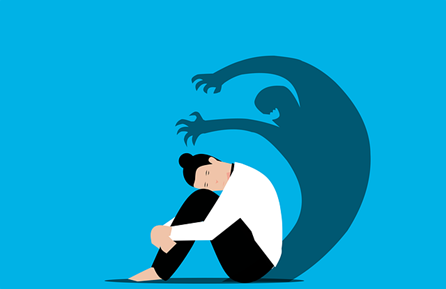
Type 2 Anxiety is just as common as Type 1, but it’s more pernicious because most people who experience it mistakenly believe they’re experiencing Type 1 Anxiety.
I have a student with a serious case of Type 2 Anxiety. He’s a bright student who gets As in his classes, but for some reason, he believes that his grades aren’t good enough. He thinks he’s supposed to learn everything with ease on the first try, without taking notes, without using available resources, and without asking anyone for help. This is, of course, an impossible task, so he’s always falling short of this unreasonably high bar. As a result, he never feels like his abilities are enough to meet the challenges he’s facing. His anxiety is not caused by the objective challenges of high school, but by his subjective interpretation of them.
Most of the time we experience Type 2 Anxiety, it’s not that extreme, but we all do it. We all have irrational thoughts and limiting beliefs that make us feel inadequate.
So Don’t Believe Everything You Think
We’re naturally inclined to believe our own thoughts. So when we imagine a task is more difficult than it really is, we don’t see that we’re making a mountain out of a molehill. And when we think our abilities are worse than they truly are, we fail to remember evidence to the contrary.
Overcoming this bias requires mindfulness and practice. Don’t believe everything you think. Instead, ask yourself questions like, “How am blowing this problem out of proportion?” and “When have I handled similar challenges in the past?”

Don’t Downplay Your Abilities
One thing I hear a lot from the people around me is self-deprecation. Sometimes, people make jokes at their own expense, teasing themselves for procrastinating or being unable to focus. Other times, the self-deprecation is more serious, and people beat themselves up for being “lazy” or “stupid.”
Humility may be a virtue, but this kind of negative self-talk isn’t helpful. When you speak about your abilities in a negative way, you’re either saying you’re less skilled than you really are, or you’re expressing a fixed mindset. When you downplay your abilities and treat them as unchangeable shortcomings, you needlessly limit your potential.
- Replace “I’m stupid” with “I made a mistake.”
- Don’t self-identify as lazy. See yourself as someone whose willpower muscle needs exercise.
- Instead of saying “I can’t remember things,” say, “I forgot because I didn’t set a reminder.”
Ditch Perfectionism
That student I mentioned has one of the worst cases of perfectionism I’ve ever seen. He believes that the only way to succeed at school is to do it perfectly, so he always feels like he’s failing.
Perfection is an impossible ideal that can never be reached. So if you believe perfection is expected, you’re imagining that the task is something it’s really not. Practice letting go of perfectionism, and you’ll feel better.
Don’t Procrastinate
Understandably, the most common response to feeling like you’re not capable of meeting a challenge is avoidance.3 It’s hard to motivate yourself to start something when you believe you’re doomed to fail. Thus, Type 2 Anxiety causes procrastination.
But when you have Type 2 Anxiety, you’re not actually incapable, you just think you are. And the best way to prove yourself wrong is to attempt the work. Get started, and you’ll probably find that you do, in fact, have what it takes.
However, if you fail to get started, you can transform Type 2 Anxiety into Type 1 Anxiety. A two-week task that’s very challenging might become downright impossible if you wait until the last minute. You had the skills to get do it, given enough time, but now that there are only a few hours left, the challenge is genuinely over your head.

Thus, overcoming procrastination is a powerful way to reduce anxiety.
Beating Both Types of Anxiety
Sometimes, we experience both types of anxiety simultaneously. Let’s use social anxiety as an example.
Type 1 says, “I don’t know how to remember names, listen well, or keep a conversation going. I’m awkward, and I lack charisma.”
Solution: Learn social skills (like how to remember names), practice having conversations, and put your phone away. Learn charisma. (It’s a learnable skill. See: The Charisma Myth.)
Type 2 says, “To succeed at social interaction, I have to get everyone to like me, but people don’t like me. They’re always judging me negatively.”
Solution: Recognize that these beliefs are nonsense. People aren’t paying as much attention to you as you think. And although many people do like you, you can’t make everyone like you, so don’t worry about that.
If you buy into Type 2 Social Anxiety, you’ll be so worried about how you’re performing that you’ll be awkward and distracted in conversation. In other words, believing that you’re inadequate can be a self-fulfilling prophecy because anxiety causes you to behave in ways that are unhelpful.
Don’t Let Your Anxiety Prove Itself Right
Type 2 Anxiety always starts as a set of false beliefs: The task is too hard, and I’m not skilled enough to do it. But if you allow these beliefs to drive your behavior, they become increasingly true, and Type 1 Anxiety joins the party.
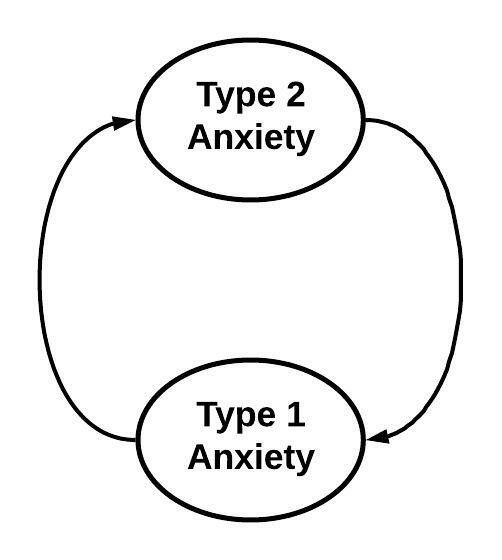
- You believe the task is too hard, so you delay starting or avoid being resourceful, making the task harder.
- You believe you’re not skilled, so you become self-conscious, causing you to perform more poorly.
- Because the task is now genuinely above your skill level, your original beliefs are vindicated and your Type 2 Anxiety is reinforced.
So don’t let the false belief that something is impossible prove itself right. And keep in mind that this feedback loop also works the other way. Reducing your Type 2 Anxiety improves your performance, which reduces your Type 1 Anxiety. This, in turn, makes you feel less inadequate, further reducing your Type 2 Anxiety.
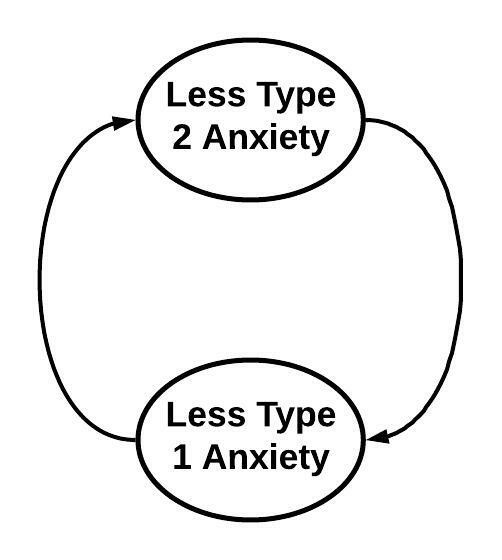
Very often, the only way to overcome your anxiety is to do the work. Begin the task, and in doing so, you’ll become more skilled and prove to yourself that you’re capable.
Overcoming Type 3 Anxiety
Finally, the third type of anxiety doesn’t have anything to do with challenging tasks. Instead, it results from worrying about things that are outside of your control – things you have no influence over.
Will China invade Taiwan?
Are we headed into a major economic recession?
Will Monkey Pox become a new global pandemic?
Yikes.
Consume Less News
Unsurprisingly, watching or reading the news too often is a common cause of Type 3 Anxiety. The news mostly covers bad things – tragedies, disasters, wars – that you are powerless to change. This not only makes you feel bad in the moment, but it also causes you to feel justified in worrying about all the other bad things that might happen in the future.
So you should consume less news. But more broadly, the solution to Type 3 Anxiety is a combination of Stoicism and Buddhism.
Stoicism
One of the core tenets of Stoic philosophy is to differentiate between what you can control and what you cannot. Most of the things that you worry about are outside of your control, so it makes no sense to put your mental energy toward them. Instead, all of your energy should be focused on the things you can actually influence: your own thoughts and behaviors. Be prepared, be resilient, and be virtuous.
Buddhism
Buddhism, meanwhile, teaches that we should accept whatever life throws at us. Reality doesn’t change because we resist it. Worrying about what’s to come or getting upset about what has already happened doesn’t do any good. It just causes suffering. So when you find yourself anxious about things outside of your control, take a deep breath and resolve to accept whatever comes your way.
Take Positive Action
Acceptance doesn’t mean rolling over and doing nothing while your life or the world falls apart. No, no. Acceptance is purely psychological. It’s seeing reality for what it is without pointless worry or anger, and without the need to distract or numb yourself. Then, from that place of calm, rational acceptance, take positive action.
Part of Type 3 Anxiety is feeling powerless – feeling like there’s nothing you can do to make things better. But that’s never true. No, you can’t solve global warming or poverty or gun violence all on your own, but your actions can make a difference.
So don’t let anxiety dictate your behavior. Choose to take action in spite of your feelings. And while you’re doing that good work, you might just find that your anxiety disappears.
1 Csikszentmihalyi, Mihaly. Flow: The Psychology of Optimal Experience. Harper Perennial Modern Classics, 2008.
2 Dweck, Carol. Mindset: The New Psychology of Success. Ballantine Books, 2007.
